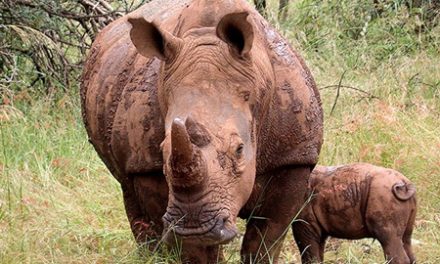
Bush encroachment must be curbed

The Minister of Agriculture, Water and Forestry, John Mutorwa speaking during the first ever National Bush Encroachment and Value Addition Conference at the Safari Court Hotel in Windhoek. Photograph by Support De-bushing Project.
The meat industry alone is estimated to lose more than 1.5 half a billion N$ per year. This is mostly due to high losses from bush encroachment according to Frank Gschwender, The Support to De-bushing Project leader during the National Bush encroachment and Value Addition Conference held on September 23 at the Safari Court Hotel in Windhoek.
But this is only a fraction of the economic losses. Further losses are experienced in the form of reduced groundwater recharge, a loss of biodiversity and reduced tourism potential.
Insufficient funding has been said to be one of the hindering factors against bush encroachment due to high investments cost of N$100 to N$1200 per hectare.
“As the economic and environmental losses caused by bush encroachment do not only affect individual farmers, but affect the nation at large, it was deemed appropriate for the Government , to regard this problem as a national problem” said Hon. John Mutorwa, Minister of Agriculture, Water and Forestry during the conference.
Economic losses due to land degradation were repeated by several speakers during the first De-bushing conference hosted by the Support to De-bushing Project as part of the bilateral cooperation agreement between the Government of Namibia and the Government of the Federal Republic of Germany.
The project forms part of the countries wider cooperation on Natural Resource Management. The project was launched in early 2014 and will run until December 2017.
A study on the Economics of Land Degradation has been commissioned to the project to measure the impact.
The project aims at developing methods and strategies for the upscaling of bush control efforts in the country by enabling policy and regulation environment. A De-bushing Advisory Service has also been established to support farmers and businesses in the value addition of biomass value chains.
The project’s key strategy is to marry the problem with opportunities by identifying and promoting value chain opportunities in the processing and utilisation of encroacher biomass and creating demand for biomass allowing for large-scale de-bushing activities.
130 participants attended the first National Conference on Bush Encroachment and Value Addition and 10 exhibitors displayed their products. These included animal feed, wood carvings, bush briquettes, wood chips, charcoal, fuel efficient cookstoves and bush harvesting equipment.
The project also provides knowledge and advice through the De-bushing Advisory Service (DAS) and supports pilot projects in the priority value chains.
According to Gschwender, once a number of different value chains are established or significantly improved the project can be considered a success. More so when these value chains trigger large scale and sustainable bush harvesting. The current focus is on bush-to-electricity, animal feed, charcoal and household energy. But a range of 15 different products has been identified.
During the conference highlights included the bush-to-electricity panel discussion, the conference was attended by representatives of both government authorities, private sector stakeholders and the farming community.












































